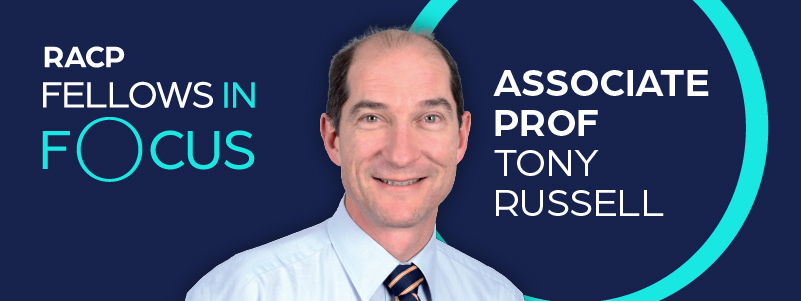RACP Fellows in Focus: A/Prof Tony Russell
Date published:
02 Aug 2021

“It might be a bit cliché, but I do think genuine compassion for our patients and a desire to help those less fortunate than ourselves is my most valuable skill,” reflected Associate Professor Tony Russell. “I have also gone on to, not just to be a clinician, but also a leader and director of a department. I'm a good listener, non-confrontational and like to lead by example.”
Tony is Director of the Department of Diabetes and Endocrinology at the Princess Alexandra Hospital, Brisbane, President-elect of the Australian Diabetes Society and previous Co-Chair of the Queensland Statewide Digital Diabetes Network and Statewide Clinical Diabetes Network. He is recognised nationally as a key opinion leader in the field of diabetes. His research interests revolve around models of care for the management of diabetes and has been a Chief Investigator on NHMRC grants in this field. Tony works closely with GPs and has developed a model of care for the management of complex Type 2 diabetes in the community with up-skilled GPs. He has provided outreach services to Mt Isa, Cloncurry and Cunnamulla and has established a telehealth service, delivering diabetes services to rural and remote Indigenous and non-Indigenous communities across Queensland. His exhaustive list of achievements doesn’t end there, Tony has been on the advisory group for the IDEAS project which has increased rates of retinal screening and treatment of retinopathy in indigenous people with diabetes. He also has over 120 publications.
So, how did such an accomplished Fellow end up on his medical path? Tony shared, “During medical school, I quickly became aware I didn't want to become a surgeon. General practice had too many unknowns and I was more comfortable knowing about an area in depth. I knew I was a problem solver and I saw being a physician as a way to match my personality with my skills.”
Tony was incredibly headstrong in knowing what direction to take himself, but had he been influenced or been guided by anyone during his medical professional? He told us, “We all have mentors. My greatest mentor was Professor John Prins. He was an endocrinologist and Director of Diabetes and Endocrinology at the PA Hospital when I was a student and junior doctor. John was a decent person, smart, time-efficient, a good leader, and had that amazing ability to make sure that whenever you interacted with him and walked away from him, you felt better about yourself. That really inspired people working underneath him and that's what attracted me to endocrinology.”
For those in admiration of Tony’s achievements on his road to success, he offered some advice, “Louis Pasteur said that “fortune favours the prepared” and I believe you need to have a vision. You need to be determined and to work hard. You've got to do what is right, but question rules. Question them why they were developed, whether they're still relevant for the current situation you're trying to change and get people to think differently about them. I think that's important when you're trying to new things that are innovative, to get people to think outside of the box. That's the only way you're going to be able to achieve change. Some things are timing, but if you are prepared for that, you’ve had the vision, you've got the concept, you've got the skills and you've done the work to achieve those skills, then things will fall in place.”
For Tony, it may have been difficult to pick out highlights from such an illustrious career and to consider his legacy, but he didn’t hesitate in saying, “Achieving my PhD really took me out of my comfort zone.”
“I was a fully-fledged clinician with the College when I went and did a basic science PhD. It was very humbling to have science students suddenly teaching me how to use a pipette. I had to think critically, I had to be resilient, I learnt time management, I worked with a new network of people living off a low wage, something like a $30,000 PhD stipend, and appreciating the simple things in life. Getting that PhD was a sense of achievement that then set me up in my career and opened up doors.”
“In terms of my legacy, I'd like to think that people appreciate that I influenced the lives of many people with diabetes through systems of care that I've developed. My models of integrated care, educating other health professionals, acting as a mentor and taking on positions where I've been able to influence the state government policies and systems. I'd like to think of it as having achieved that as a legacy, but also achieved that as a balanced human and compassionate individual. As well as being a good father and husband.”